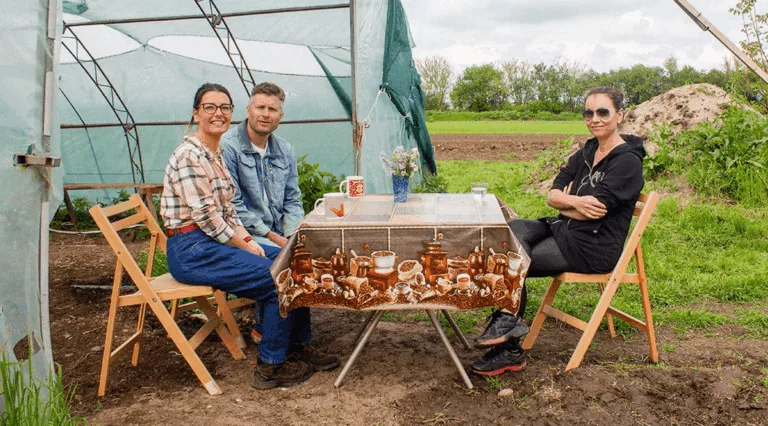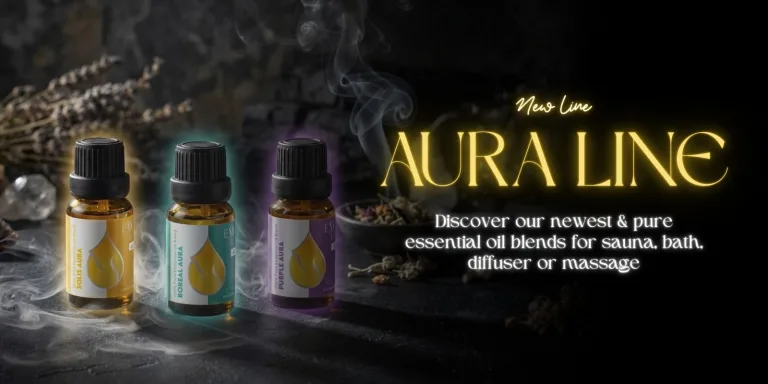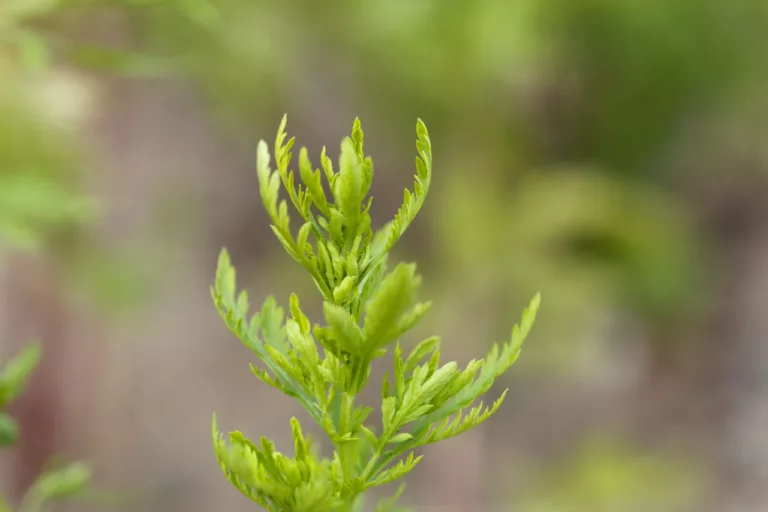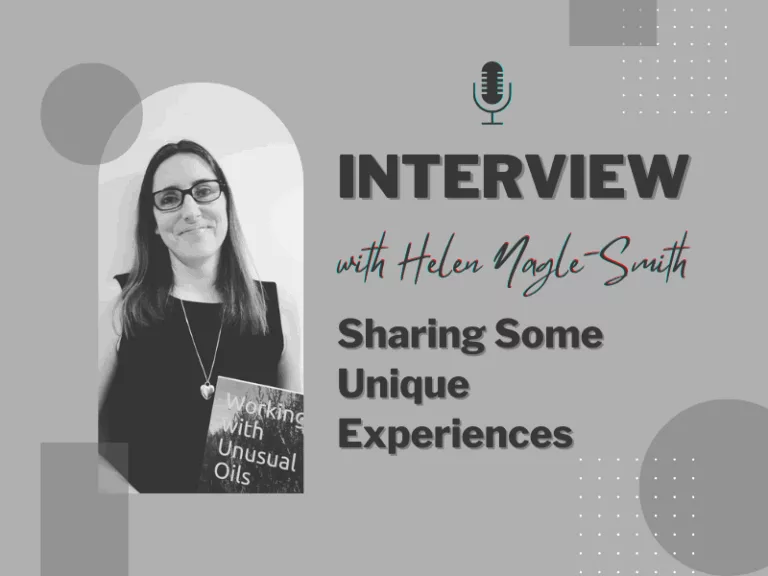To Head for the Woods with Galya Shtarbeva on Nova TV

The team of the show “Да хванеш гората” (To Head for the Woods) sought out Jonathan and Pavlina Middendorf to share their story.
An inspiring story about how you can leave the city, head for the woods, and find happiness, your mission in life, and in business. About the good, the bad, and the difficult — uncensored, from the creators of Essences Bulgaria.
“…I saw meaning in what I was doing. Everything that comes from the earth, from your own hands, always has meaning. It’s not just the hard work — there are many beautiful moments too. It’s wonderful in the morning when you’re in the field and see the sunrise. There’s no view more beautiful than that. You won’t see this in an office, nor in front of a computer. Being surrounded by nature gives me energy…”
How did a German from Hanover end up in Bulgaria, in a village near Ruse?
Jonathan: I grew up in Hanover, right in the city, where everything is organized and orderly, but even then, I didn’t like it because I missed challenges. As a child, I wanted to go to Africa. I studied in Germany, Lithuania, Estonia, spent a semester in Australia, and then returned to South Africa. Later, I also studied in New Zealand, and then returned to Germany again.
When I finished my studies and started looking for work, the first job I found was in Bulgaria. I didn’t know anything about Bulgaria, but I thought, “Why not give it a try?” I came here, and I really liked it.
Pavlina: I completed my bachelor’s degree in Bulgaria and my master’s in Germany, where I studied Cultural Studies at the European University Viadrina.
We didn’t meet in Germany, as everyone assumes, but here in Bulgaria. My master’s thesis supervisor was German, and they were friends. She introduced us because Jonathan didn’t want to live in the city — he wanted to live in a village.
At that time, I lived in a village with my family. He wanted me to show him some places so he could rent a house and live in Nikolovo. A week later, we moved in together, and soon after, our daughter Valeri was born.
I didn’t want to live here initially because I had graduated in Germany and thought we would have a better future and more security there. Jonathan insisted we stay. Somehow, he fell in love with Bulgaria. He didn’t want to live anywhere else. He couldn’t imagine our life anywhere else but in the village.
Where does this love for Bulgaria come from?
Jonathan: Well, from the people and the nature. It’s unique here. There are many wonderful people who help you when you need something, and you can meet spontaneously. No need for prior arrangements — you make a call, and things happen. In Germany, you always need a plan.
How did the idea for organic farming, walnuts, and essential oils come about?
Pavlina: We decided together. At the time, oregano was very popular in Bulgaria, and the oil price was very good, so the first year we did a small experiment. We planted about five decares, and the harvest looked amazing. The next year, we decided to expand the business — but instead of doing it gradually, we decided to plant 70 decares.
My brother Veliko joined the business then. It was very hard work; we got up at 4 a.m. Farming is killer work, especially if you want to do organic farming — it requires a lot of manual labor. The land isn’t treated with chemicals, so it needs many hands.
Veliko: I was won over by the idea when they were discussing moving to Germany. We decided to do something together in Bulgaria so they could stay here and be close to us. As you know, we Bulgarians love family and being close.
Is it hard to work with family?
Veliko: Oh yes, when strong personalities are involved — like Jonathan, my sister, and me — it’s hard, but in general, compromises come easier in a family.
Pavlina: The next year was very tough because what we had as a sample didn’t match what we had from the first year. The production was very low, and the price of oregano dropped; no one wanted to buy our product. We were, to put it mildly, in crisis — bankruptcy.
Jonathan: We fell, and we got back up again.
What kept you going?
Pavlina: Jonathan. He has a very strong spirit. My brother too. After the first year, I was ready to give up. We had invested so much effort, and nothing worked. Then we started sending samples of the oil all over the world. One American company liked one of our products — Moldovan dragonhead — and bought the entire production at a very good price, saving us from our first bankruptcy.
Jonathan: Actually, we were the first to produce essential oil from Moldovan dragonhead. Initially, we were completely attracted by the plant’s aroma, but it turned out it also has excellent analgesic properties — it helps with pain.
Veliko: Currently, we have many herbs that we grow ourselves in our plantations. They are organic, which is why there are a few more weeds 🙂 We grow oregano, savory, damascena rose, alba rose, lavender, and many other herbs characteristic of Bulgaria.
Jonathan: Walnuts also helped us recover from the crisis. They don’t require as many resources as conventional crops in terms of irrigation, and they’re better for the environment.
Where do you sell now?
Jonathan: We sell walnuts mainly in Europe and essential oils almost worldwide.
What’s the most interesting place someone has bought your products from?
Pavlina: South Africa.
Jonathan: We also had an order from Bora Bora and Syria, during the war. Delivery was nearly impossible. We had to send it via Dubai.
Before coming to Bulgaria, did you know anything about essential oils or Bulgarian rose?
Jonathan: Oh no. I only knew that there is rose oil from Bulgaria. It’s world-famous. Beyond that, I had no idea what it’s used for or how it’s extracted.
Veliko: In our region, winter is a problem because it’s very cold. We feared there would be a lot of frost, so we started with a small “experimental” field. We saw that weather wasn’t such a problem, and the plants thrived — things worked out.
As a woman who studied Cultural Studies in Germany, how did you make such a sharp shift to farming? Were there moments you thought, “What have I done?”
Pavlina: Yes, there were moments when I woke up and thought, “Wouldn’t it have been better to be in the office at 8 a.m.?” I saw meaning in what I was doing, because anything that comes from the earth, from your hands, always has meaning. It’s not just hard work — there are many beautiful moments. It’s wonderful in the morning, when you’re in the field and see the sunrise. There’s no view more beautiful than that. You won’t see this in an office or in front of a computer. Being surrounded by nature gives me energy.
Where does your desire to live in a village come from?
Jonathan: Well, things happen more slowly here, which I think is the normal way for things to happen. I like sitting with the grandmothers on the benches. I sit with them and chat. We talk about ordinary village things — whether there will be frost, whether it’s too early or too late to plant tomatoes, those kinds of village topics.
There are also negative aspects in Bulgaria, of course. For me, the main thing is complaining people. It’s fine to criticize, but I don’t like it when people just complain and do nothing. Cleaning your yard and throwing your garbage into your neighbor’s yard — I don’t like that mentality.
Do you ever miss that German mentality — everything organized and orderly?
Jonathan: Yes, mainly regarding work — it’s good to have order. At the same time, being able to improvise is also very important.
What did people say when you were starting out?
Pavlina: I don’t think I gave up anything in life by moving to the village. Other people’s opinions aren’t that important to me. What matters is that my choice is important to me. I’m happy with the choice I made.
At first, I knew nothing about herbs, but then I developed a genuine interest. I attended many conferences, took many courses and trainings, and read a lot.
We distill all herbs ourselves. For example, clary sage is an oil we call “the women’s oil” because it helps with many female ailments — it balances hormonal health.
Can a family make a decent living from everything you do?
Pavlina: Yes, it’s possible to live well. It’s nice that in recent years there are many European subsidies given to farmers. You won’t live in luxury, but if someone chooses this lifestyle, they will have enough to support their family.
When you do farming, you must put your whole heart into it to see results. The most important thing is not to get discouraged and give up. There are always ups and downs. Agricultural production depends heavily on climate conditions.
Jonathan: There’s a big difference between conventional and organic farming. You need drive and a plan for what you want to do, and you need to be aware of whether there’s a market for it.
How do you explain that so many foreigners, mainly British and Germans, choose Bulgaria?
Besides cheap alcohol for the Brits (laughs), it’s the love of the people and the good weather. People and neighbors help each other. You rarely see this in England or Germany.
We will continue to develop our business with herbs and essential oils, doing what makes us happy. We have many plans. One day, we want to build a home for children without parents.
Pavlina: His idea of a home for children without parents makes me very happy. I love children; they give us joy, so I would also be very glad if we could make this initiative a reality. We’ve invested a lot in our business, and maybe it’s time to start a social project. Money alone doesn’t bring happiness if you don’t share happiness with someone else.
Thank you for the inspiring meeting to Galya and Petko from the show “Да хванеш гората” (To Head for the Woods), and see you soon!


